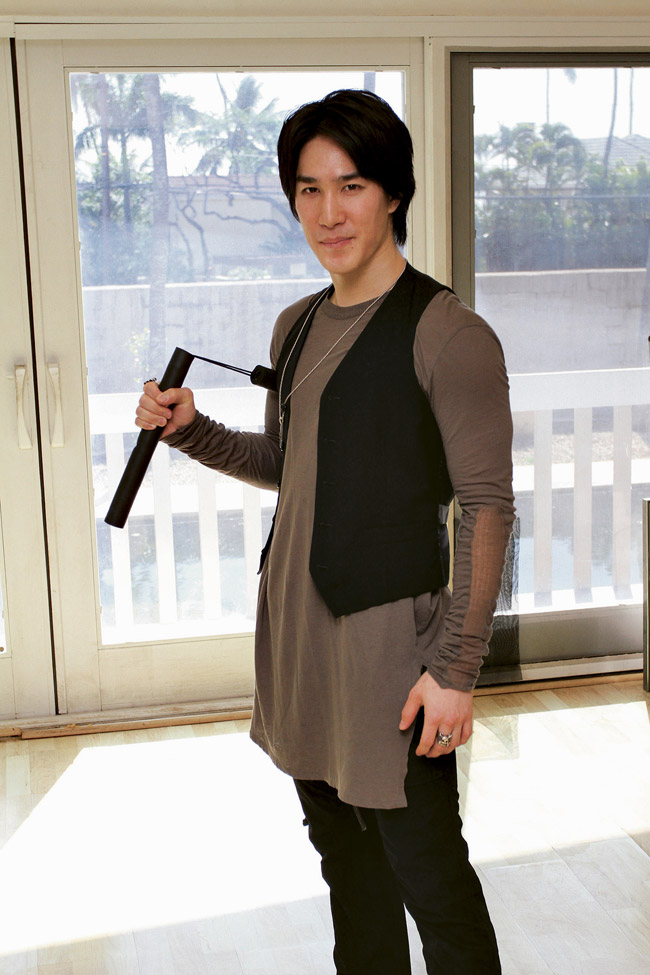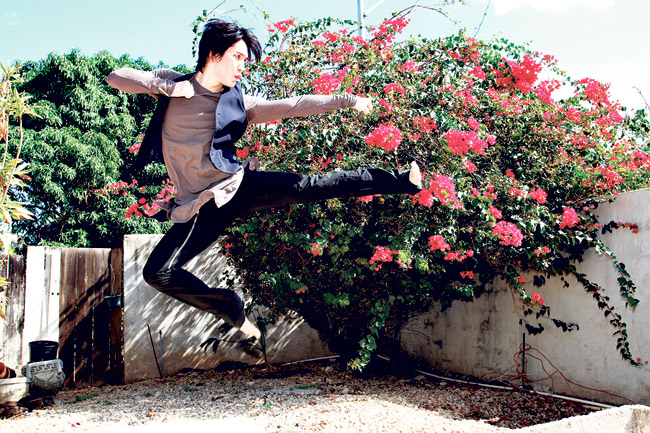Jail Adventure Of The Ninja Dancer
A martial arts prop to be used on a televised dance competition landed Hawaii’s Cole Horibe accidentally in one of L.A.’s worst jails
Dancer Cole Horibe makes a lot of leaps in life. Most of them are performed in dance moves, but an incident left him up in the air and in trouble with the law. It could have been a dramatic stumble in a promising dance and acting career.
Horibe’s story is part Chorus Line and part Enter the Dragon.
He is a dancer trained in Asian self-defense who has mastered a self-styled genre he calls martial arts fusion.
“I’m a walking cliché,” he says. “I’m an Asian male who’s a martial artist.”
Horibe’s Facebook profile states he’s “a ninja who uses dancing to surreptitiously disguise his assassination techniques.”
The producers of So You Think You Can Dance (SYTYCD), the Fox-TV dance show in which Horibe competed, call him The Karate Kid.
As a dancer, his intense focus and discipline have served him well, both on stage and in life. He has met challenges with an inner strength that translates into physical might.
As he steps and conforms his body to choreographed dance movements, SYTYCD
judges gasp with amazement at Horibe’s strength and agility.
“Stunning,” says Nigel Lythgoe.
“Your legs are lethal and lightning fast,” exclaims Mary Murphy.
“Spectacular,” hails choreographer and director Rob Marshall at an audition.
Exceptional dancing earned Horibe top 6 ranking before being eliminated from SYTYCD Season 9 competition.
Little known to viewers is that the Honolulu resident almost didn’t make it past his solo audition in Los Angeles because of an airport security misstep last March.
An aspiring actor, he now knows that life is not scripted, nor neatly choreographed.
It started innocently enough, when 26-year-old Horibe prepared to board a flight from Los Angeles to Honolulu, after auditioning for the nationally televised dance contest. He took a nunchaku (or nunchuk) as a dance prop. Nunchaku (nuhn-chah-koo) is a traditional Okinawan weapon consisting of two sticks connected at one end with a short chain or rope. The fighting device that is swirled and twirled by precise wrist action was popularized by martial arts actor Bruce Lee in his movies.
In four states – California, Arizona, New York and Washington – nunchaku are termed lethal weapons and subject to criminal prosecution if found in one’s possession outside of a dojo or martial arts studio. When the karate fighting sticks were detected in Horibe’s carry-on bag, he was detained by Los Angeles Airport Transportation Security Administration (TSA) agents and later taken by police, who handcuffed him to a chair for five hours while processing his arrest at a jail in Culver City.
“It never crossed my mind that they might be illegal,” Horibe says. “I placed the nunchuk in my carry-on bag and in my haste, forgot to transfer them to my check-in luggage.”
What ensued at the Culver City jail seems like a scene out of reality TV, as Horibe awaited his fate while isolated in a holding cell. The mild-mannered Kalani ’03 grad with no criminal record couldn’t believe the drama that ensued, including being advised by a SYTYCD representative that it is against FOX network rules for a felon to appear on the show. His chances to dance in the national competition, after a triumphant audition in L.A., seemed dim.
The Japanese-Korean-Russian dancer, whose ancestors are samurai, approached this challenge with the soul of a fighting hero. Since he was a child, he has met personal attacks courageously. His mother, Wanda Horibe recalls how calmly and bravely her son handled an incident in kindergarten at Kahala School when a bully stabbed him in the head with a pair of scissors.
“This was Cole’s traumatic introduction to elementary school,” his mother recalls with trepidation.
That indomitable spirit prevailed as Horibe quietly waited in the Los Angeles jail cell to be cleared for what he thought was a minor incident. When matters seemed to get worse, rather than better, Horibe retained legal counsel.
“My legal strategy was to explain to the prosecutor that the nunchakus were being employed for strictly theatrical or entertainment purposes,” says attorney Mia Yamamoto. “I asked for and was given a city attorney hearing, which is something akin to a mediation, and which allows for the non-filing of the charge and no prosecution despite the arrest.”
Horibe was able to return to the Islands and resume his quest for the dance championship. But he is not likely to forget his tangle with criminal justice.
Horibe’s advice to travelers is to do your homework. There is a list of prohibited martial arts and self-defense items on the TSA website (tsa.gov).
Nunchuk is a no-no, along with billy clubs, brass knuckles and throwing stars. Besides the four U.S. states mentioned, countries including Canada, United Kingdom, Spain and Norway also have outlawed several martial arts devices.
So, to paraphrase that Johnny Cash tune, “Don’t take your nunchuk to town, son. Leave your nunchuk at home.”
Thanks, Cole Horibe, for taking us through the dance.







